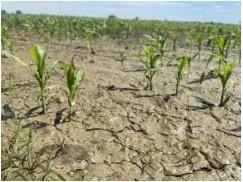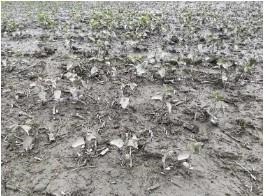By Osler Ortez and Laura Lindsey et.al
Unfavorable weather during the months of April, May, and early June has negatively affected corn and soybean acres establishment in the state. If considering replanting fields, a C.O.R.N. Newsletter article released in mid-May has several steps and considerations that can help the decision.

Mud in soybean field
Read the article here: https://agcrops.osu.edu/newsletter/corn-newsletter/2022-14/replanting-decisions-corn-and-soybeans%E2%80%A6-what-consider
If soil crusting/emergence is a concern, it may be more beneficial to consider using a rotary hoe to improve emergence than re-planting. For agronomic crops, we are approaching the period where gains in stands won’t offset yield losses caused by a shortened growing season. Other considerations are to consult with your crop insurance agent and seed company reps on any replanting policies or assessments required prior to implementing this practice.

Flooding in soybean field
Source : osu.edu